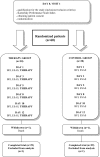Physiotherapy programme reduces fatigue in patients with advanced cancer receiving palliative care: randomized controlled trial
- PMID: 28508278
- PMCID: PMC5527074
- DOI: 10.1007/s00520-017-3742-4
Physiotherapy programme reduces fatigue in patients with advanced cancer receiving palliative care: randomized controlled trial
Erratum in
-
Erratum to: physiotherapy programme reduces fatigue in patients with advanced cancer receiving palliative care: randomized controlled trial.Support Care Cancer. 2017 Sep;25(9):2909. doi: 10.1007/s00520-017-3779-4. Support Care Cancer. 2017. PMID: 28616650 Free PMC article. No abstract available.
Abstract
Purpose: Cancer-related fatigue (CRF) is a common and relevant symptom in patients with advanced cancer that significantly decreases their quality of life. The aim of this study was to evaluate the effect of a physiotherapy programme on CRF and other symptoms in patients diagnosed with advanced cancer.
Methods: The study was designed as a randomized controlled trial. Sixty patients diagnosed with advanced cancer receiving palliative care were randomized into two groups: the treatment group (n = 30) and the control group (n = 30). The therapy took place three times a week for 2 weeks. The 30-min physiotherapy session included active exercises, myofascial release and proprioceptive neuromuscular facilitation (PNF) techniques. The control group did not exercise. The outcomes included Brief Fatigue Inventory (BFI), Edmonton Symptom Assessment Scale (ESAS) and satisfaction scores.
Results: The exercise programme caused a significant reduction in fatigue scores (BFI) in terms of severity of fatigue and its impact on daily functioning. In the control group, no significant changes in the BFI were observed. Moreover, the physiotherapy programme improved patients' general well-being and reduced the intensity of coexisting symptoms such as pain, drowsiness, lack of appetite and depression. The analysis of satisfaction scores showed that it was also positively evaluated by patients.
Conclusion: The physiotherapy programme, which included active exercises, myofascial release and PNF techniques, had beneficial effects on CRF and other symptoms in patients with advanced cancer who received palliative care. The results of the study suggest that physiotherapy is a safe and effective method of CRF management.
Keywords: Cancer-related fatigue; Exercises; Palliative care; Physiotherapy.
Conflict of interest statement
Competing interests
The authors declare that they have no competing interests.
Funding
Funding for this study was provided by the Nicolaus Copernicus University Collegium Medicum, Bydgoszcz, Poland (institutional funding).
Consent for publication
Not applicable.
Ethical approval and consent to participate
Written informed consent was obtained from all participants. Confidentiality and anonymity were guaranteed. The study protocol was approved by the Bioethics Committee of the L. Rydygier Collegium Medicum in Bydgoszcz, Nicolaus Copernicus University in Torun (KB 156/2009).
Figures




References
-
- NCCN Clinical practice guidelines in oncology: cancer-related fatigue, version I.2017 - December 19, 2016 https://www.nccn.org/professionals/physician_gls/pdf/fatigue.pdf. Accessed 22 Jan 2017
-
- Winningham ML, Nail LM, Burke MB, et al. Fatigue and cancer experience. Oncol Nurs Forum. 1994;2:23–36. - PubMed
-
- Mock V, Dow KH, Meares C, et al. Effects of exercise on fatigue, physical functioning and emotional distress during radiation therapy for breast cancer. Oncol Nurs Forum. 1997;24:991–1000. - PubMed
Publication types
MeSH terms
LinkOut - more resources
Full Text Sources
Other Literature Sources
Medical

